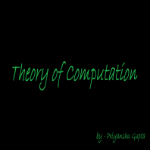
Capturas de pantalla:
Descripción
Theory of Computation Notes based on RGPV/RGTU Syllabus -
CS-505 – Theory of Computation Branch: Computer Science and Engineering V Semester Course: CS 505 Theory of Computation UNIT 1: Automata: Basic machine, FSM , Transition graph, Transition matrix, Deterministic and nondeterministic FSM’S, Equivalence of DFA and NDFA, Mealy & Moore machines, minimization of finite automata, Two-way finite automata. Regular Sets and Regular Grammars: Alphabet, words, Operations, Regular sets, Finite automata and regular expression, Myhill- Nerode theorem Pumping lemma and regular sets, Application of pumping lemma, closure properties of regular sets.
UNIT 2: Context –Free Grammars: Introduction to CFG, Regular Grammars, Derivation trees and Ambiguity, Simplification of Context free grammars, Normal Forms (Chomsky Normal Form and Greibach Normal forms).
UNIT 3: Pushdown Automata: Definition of PDA, Deterministic Pushdown Automata, PDA corresponding to given CFG, CFG corresponding to a given PDA. Context Free Languages: The pumping lemma for CFL’s, Closure properties of CFL’s, Decision problems involving CFL’s.
UNIT 4: Turing Machines: Introduction, TM model, representation and languages acceptability of TM Design of TM,Universal TM & Other modification, Church’s hypothesis, composite & iterated TM. Turing machine as enumerators.Properties of recursive & recursively enumerable languages,Universal Turing machine
UNIT 5: Tractable and Untractable Problems: P, NP, NP complete and NP hard problems, examples of these problems like satisfy ability problems, vertex cover problem, Hamiltonian path problem, traveling sales man problem, Partition problem etc.
*** Takes time to load, if you have a slow internet connection.

